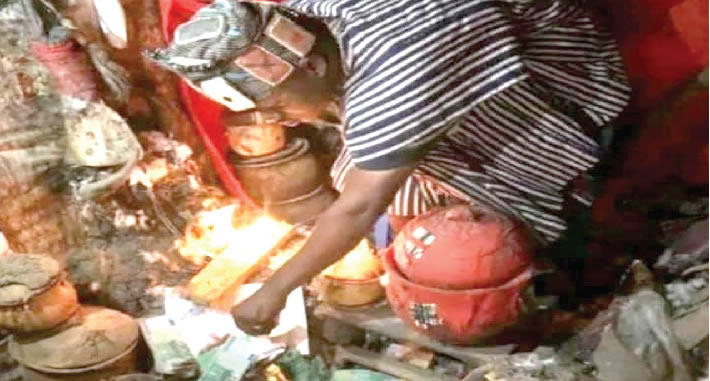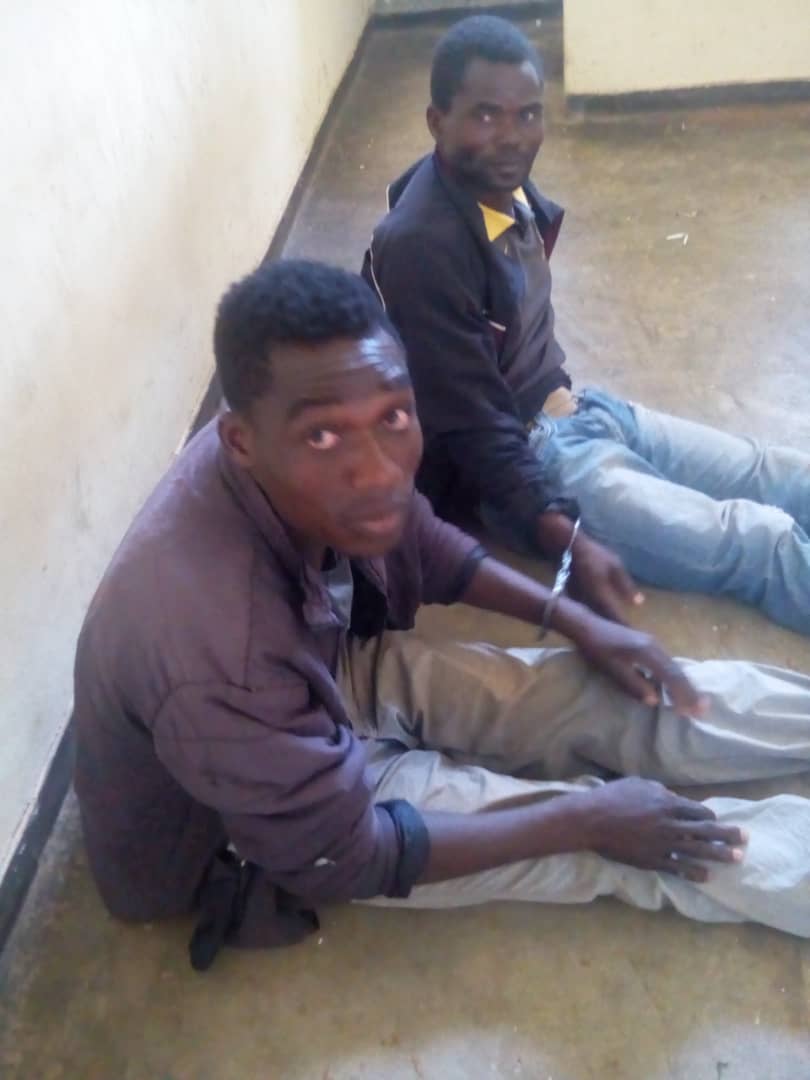The following article is highly recommended reading, excellent work by Victor Ayeni!
In Nigeria, nearly every day ‘money rituals’ are reported, maybe not surprising in view of the country’s large population of well over 200 million people – Africa’s largest – even though just one ritual murder is already one too much. However, on the other hand, it could well be that the cases known and reported are only the tip of an iceberg.
But what do we know about ‘money rituals’, as ritual murders are being called in this part of the African continent? Most articles reporting on these crimes, which are driven by greed – for power, prestige or wealth – and based on superstition, are superficial. It is hard to find an article which treats this phenomenon in depth and in a serious way. The Nigerian journalist Victor Ayeni has done a great job and he’s to be commended for this achievement.
The traditional history of ritualistic killings and human sacrifices point to protection of the community’s interest by sacrificing one of its members. Cruel as this might be in our eyes nowadays, in the 21st century, back then relatives of the victim may have been proud of their family member’s contribution to the community.
We see nowadays in many parts of the African continent that the ritualistic act which demands the death of the victim is for the (pretended, aimed) benefit of one person only who thus wants to increase his or her power, wealth or health. Moreover, the victim is often picked at random. Involuntary, the victim is attacked and tortured, what results is a gruesome, a wicked crime. Sometimes, specific groups are targeted, e.g. people with albinism, hunchbacks or bald people.
In some countries ambitious politicians tend to resort to these practices in the hope of increasing their political chances and success, resulting an increase in ritual murders during election campaigns. It’s a shocking reality – even though we don’t known the full scale of it.
‘Money rituals’ in Nigeria show another characteristic: some people consider it a business model, which enables them to ‘earn’ money from superstitious people who believe that by using another man’s organs or other body parts, ‘juju’ will be created, to their personal benefit.
Victor Ayeni explains well how this works in Nigeria. A very informative article which ends with the question ‘Are money rituals real or a fiction?’
The reader may answer this question for him- or herself after reading Ayeni’s valuable article.
(webmaster FVDK)
Money ritual seekers’ dark walk into deceit, misery

Published: March 18, 2023
By: Victor Ayeni, Punch – Nigeria
VICTOR AYENI explores the subject of money ritual in popular culture, religious houses, and Nollywood movies, why the purveyors of the belief succeed in deceiving youths, and its implications on the public
The apprehension in the air was so thick that one could cut through it with a knife as Olajide (surname withheld) narrated his journey through a maze of confusion.
The 27-year-old graduate was helping a friend manage a pig farm in Osogbo, Osun State, when another friend introduced him to Internet scam, which in Nigerian lingo is called Yahoo Yahoo.
But his experience shocked the wits out of him.
“I was being paid N10,000 per month at the farm, but the money couldn’t meet my needs as time went on, so a friend of mine bought me an iPhone and from there, I was introduced to Yahoo Yahoo.
“I started off on a neutral ground and I was getting little money from my clients (victims), but after like three months into it, things became so tough that I couldn’t fend for myself again. I explained my situation to a friend and he took me to an Alfa (cleric),” Olajide recalls, shaking his head in disbelief.
This Alfa was known in Yahoo boys’ circles to be adept in the art of money magic – an occult economy that involves the performance of rituals to supernaturally conjure money.
Abode of fear
When Olajide described his financial difficulties to the Alfa, he was given two options.
“Alfa said he would help me out with small osole. I asked what he meant by that and he explained that osole (spiritual assistance) is different from oso (human body parts).
“Alfa told me oso required the use of human parts for material wealth with repercussions such as untimely death or insanity, whereas osole required the use of plants and animals for the same purpose but with lesser repercussions like being poor. I opted for osole,” he added.
Olajide was instructed to pay a sum of N12,000 into the cleric’s bank account for the materials and return in four days.
Five days later, when Olajide put a call through to the Alfa, he was asked to return for the materials.
He said, “When I got there, he gave me a small black soap and told me to find small palm oil and go to a flowing river to bathe that I had to cleanse myself first before I would use the materials.
“He explained to me that the soap was made with pepper mixed with some herbs and directed me to rub the palm oil on my body first before bathing with the soap. He warned that if I didn’t use the palm oil first, I was going to disappear and I would not be seen again. So, I did as I was told.”
Olajide said he complied with all the instructions.
“When I went back to him, he gave me three different materials: a soap to bath with every morning by 4am, a potion which I must swallow daily after taking my bath, and a powdery mixture to be licked every night before I go to bed.
“He said the herbal concoction was made from animals like crow, chameleon, cat, pigeon, and some leaves. He also told me that I would experience more hardship during the first two or three months of using the ritual materials, but I should endure it because after that, the tide will turn and money will be flowing in from my clients,” he added.
The idea of recipients conjuring money through magic is a familiar theme in many Nigerian films and religious houses.
Whether through animal sacrifices or trafficking in human parts, it is erroneously believed that these rites bring stupendous wealth to those who practice them.
When our correspondent inquired from Olajide if the magic worked, and in what specific ways the money came to him, he was silent.
When he spoke, he recalled faithfully following all the instructions given to him, but for the next two months, as the cleric predicted, he experienced serious financial hardship.
At this point, he said his friend introduced him to a client (victim), who had been defrauded several times.
Olajide then began to siphon money from the victim.
The inexplicable ease with which his ‘client’ gave him money implied that he (client) had been hypnotised.
“I ended up getting plenty money from this client. The cleric had assured me of having lots of money from osole, but he advised me to return to him for an upgrade of the ritual by paying N450,000, saying I would be making millions of naira after using the alleged ‘upgraded’ soap.
“But I didn’t go back because I asked my friend who took me there about what the new upgrade entails since that was what he did, and he warned me sternly against it because of the repercussions behind it.
“He said once I bathe with the ‘upgraded’ soap the cleric would prescribe, I could only wear the clothes and shoes I had and I must not change them for the next two years,” he added.
Four months after he dabbled in osole, Olajide realised that his fortunes began to dwindle as reality pulled the plug on his gravy train.
He said, “Things suddenly turned sour after four months. The client I was getting money from was arrested and ended up in jail and I no longer had any financial link. I ended up becoming more broke than before.
“My friend found me another client but I ended up wasting money rather than gaining some. Then, I was taken to another voodoo practitioner. This one said he would perform a ritual for me but one of its conditions was that I must never have sex with more than one girlfriend for the next three years and if I did otherwise, I would run mad.
“It was then I decided to withdraw from this stuff and went back into teaching for some time. Later on, I was introduced to the crypto business that I now do.”
The poverty factor
The belief in gaining wealth through mystical practices has gained much appeal over the decades in Nigeria with the exponential rise in poverty and lack of equal economic opportunities, especially for young people.
According to the 2022 Multidimensional Poverty Index Survey released by the National Bureau of Statistics, 63 per cent of Nigerians, which account for 133 million citizens, are multi-dimensionally poor due to a lack of access to health, education, living standards, employment, and security.
The unemployment rate in Nigeria has not only increased constantly in the past years, the Nigerian Economic Summit Group has also projected that the country’s unemployment rate will hit 37 per cent in 2023.
However, investigations by Saturday PUNCH showed that many Nigerians fervently believe that they can make a lot of money regardless of the dire economic situations in the country through a supernatural supply of money.
Ritual killings
In Nigeria, there are various tales around wealth creation that foster the concept of one becoming rich through the manipulation of metaphysical forces in nature.
Among the Yoruba, South-West Nigeria, there is the aworo phenomenon that is believed to draw large patronage to a trader in a marketplace.
There is also awure (wealth booster) which can be prepared as a traditional soap or concoction.
Research shows that many Nigerians plank their belief in money rituals on mostly unverified reports.
This has drawn many into desperate measures, including taking the lives of close family members and friends.
In December 2021, a suspected Internet fraudster from Edo State, identified only as Osas, allegedly murdered his girlfriend, Elohor Oniorosa, for ritual purposes.
In November 2022, another Yahoo boy, alongside his herbalist, one Ike, aka Ogenesu, was arrested after policemen recovered suspected human parts at the herbalist’s place in Obiaruku, in the Ukwuani Local Government Area of Delta State.
But Ogun State appeared to have the highest number of reported incidents of such killings.
For instance, the state recorded at least 15 cases of ritual killings between January 2022 and 2023.
In January, the Ogun State Police Command arrested a 36-year-old herbalist, Taiwo Ajalorun, who reportedly confessed to the gruesome killing of a 26-year-old mother of two and two others in the Ijebu Ode area of the state.
On December 28, 2022, in the Ijebu-Ode area of the state, a gang reportedly killed three women, including a girlfriend of one of them, after sleeping with her.
In February 2022, two suspected criminals who were alleged to be ritualists were set ablaze by an angry mob for being in possession of human parts in Oja-Odan in the Yewa-North Local Government Area of the state.
Also, in October 2022, two suspected Internet fraudsters allegedly killed a 40-year-old man, Abdullahi Azeez, in Owode-Egba.
But probably the most pathetic was that of some teenagers who were caught burning the head of a female, Sofia, whom they killed for money ritual in the Oke Aregba area of Abeokuta.
One of the teenagers, Soliu Majekodunmi, who was Sofia’s boyfriend, said in January 2022 that he learnt the practice through Facebook.
Majekodunmi said he typed, ‘How to make money ritual’ on Facebook and got the details, adding that the link instructed him to behead and burn a female skull in a local pot.
Shaman or sham man?
Our correspondent found many Facebook accounts and groups created for seekers of money rituals.
Most of the social media pages had photographs of new naira notes placed in African traditional pots, calabashes, and cowrie-strewn bags, and some showed animal blood splattered on the ground around them.
Posing as a school teacher, our correspondent reached out to one of the acclaimed shamans, Babatunde (surname withheld), who resided in Ijebu Igbo, Ogun State.
In his response, he introduced his shrine as the ‘Arab Money Family’ and sent his phone number to our correspondent.
In a rather confident tone, Babatunde said, “If you are ready, even if it is this night, you will pay me and I will get the materials ready to start the ritual work for you. Most of my ritual work is done overnight and by tomorrow, it will be completed and your money will come out.
“You will send me your bank account, photograph, and full name, and you will be receiving money in your account. You will be receiving cash thrice every two weeks.”
When our correspondent inquired whether it is spirits that would be sending the money, he interjected in a mildly exasperated tone, “Listen, I will prepare the money here in my shrine and the money will be entering your account.”
He sent his ritual material price list and asked our correspondent to select the amount of money he wishes to receive in his bank account.
The list says, “N15,500 for N200,000; N20,000 for N300,000; N30,500 for N500,000; N50,000 for N1million; N75,000 for N5million; N90,000 for N20million; and N120,000 for N50 million.”
When our correspondent selected “N20,000 for N300,000,” he reiterated that his brand of ‘money magic’ utilises native materials instead of human blood.
“I make money without human blood and I only make use of native materials. I only make use of materials called ‘Cash of Hope’ and the ‘Money Drawer Oil.’
“Mind you, my work does not require any side effects or human being blood for sacrifice or repercussions, okay? Never say never to the high spirit.
“You don’t need to travel down for the ritual; I will just send them to you and you will get your money, but you must come down to my shrine with a token of appreciation for my work, any amount your heart chooses,” Babatunde added.
When the reporter complained about being unable to afford the cost of the ritual material, the magician urged him to find the money by any means possible and contact him when ready.
Babatunde was also observed to regularly post videos on his Facebook and WhatsApp statuses featuring ‘clients’ who claim to have acquired money through his rituals but the veracity of their claims could not be confirmed.
The second acclaimed money magician, who resides in Ogbomoso, Oyo State, goes by the Facebook name, Iya Ifa Bomi.
In this case, our correspondent posed as a greenhorn ‘Yahoo boy’ and asked her for spiritual assistance in order to obtain money from his ‘clients.’
She said, “You mean you are talking to your clients and they are not giving you money? I can perform a ritual for you and it will involve the use of big Titus fish, pepper, and some fresh leaves, but it will cost you N25,000.
“When you have the money, you can come to Ogbomoso and pick up the materials. I will prepare them for you. I have done this for many Yahoo boys like you and they all come back to testify that their clients are cooperating although some of them are ingrates. We also have some of us who do this work who are scammers and have made people not trust our works.”
Another cleric contacted by our correspondent, Alfa Abdulmumeen Aremu, advertised himself as a practitioner of “money rituals for engineers, contractors, business owners and ‘Yahoo boys.’”
He first demanded a sum of N2,000 and told our correspondent to send his full name and his mother’s name for spiritual consultation before he could recommend osole to him.
In a voice note, he explained, “There are different types of osole and I perform them for people like you, so don’t worry, I am adept in this work. Send me those things first and I will do some consultations to know your destiny in five minutes and I will revert to you.”
Our correspondent sent him a pseudonym along with the name of his late grandmother.
After some minutes, Aremu sent a voice note saying, “I can see you have a very bright destiny but you have some enemies. They are divided into two: some from your family and others from your workplace.
“You will cook ritual meals like rice and semo with tasty stew and give them to the children in your community. They will eat it with relish, and some of them will go to sleep. After you do that, you will be spiritually clean and we can proceed to the next stage.”
Divergent beliefs
A student of Business Administration, Kazeem Akinpelu, says money rituals are real.
“If they have not been working, people will no longer be practicing them. I grew up in Ibadan, Oyo State, and I know of a market where they sell human parts at night.
“The people selling in this particular market practice voodoo and they are patronised by those who perform money rituals. There was also one time the body parts of a lynched motorcyclist here in Ibadan were used by ritualists,” he added.
However, a civil servant, Nnamdi Okeke, dismissed money rituals as a fantasy that existed only in the realm of make-believe.
“Well, I have not come across any money rituals and I haven’t thought of doing such either. I don’t believe there is anything like ‘blood money.’
“Someone can watch a film and tell you the story, but no cult will tell you what to bring if you have not passed through their ranks, and that is if such things exist, because I don’t believe in them. The question is, the person who wants to make you rich, why is he poor and even why are their children not rich?” he asked.
Similarly, a medical scientist, Mike Okechukwu, said the whole concept of ritual killing boiled down to superstition.
“People would believe what they want to believe to obtain money. Desperate people will employ desperate measures. For me though, I don’t think ritual killings are effective; I have not seen any proof to make me believe so. It all boils down to superstition,” he stated.
But a sales representative, who gave her name as Judith for security reasons, said she once dated a man whom she believed was involved in such rituals.
She said, “I was dating this Yahoo-Yahoo guy and one day, I visited him unannounced and found that he didn’t want me to go inside his room. He was just acting weird that day.
“But while I stood at the door, he didn’t know I saw a native pot placed on the floor. From that day on, I began to suspect him and that was what made me leave him eventually because I don’t want anybody to use me for money rituals.”
Money ritual mirage
Commenting on popular beliefs about money rituals, a Professor of Philosophy of Religion at the Lagos State University, Danoye Oguntola-Laguda, said herbalists appeal to Internet scammers for pecuniary gain.
He said, “My experience is that there is nothing called money rituals. What many people mistake for money rituals is the prayer for getting rich. That could definitely involve some sacrifices of animals or birds or cooking for the whole community (saara) which brings the blessing of feeding multitudes and people may not be able to determine how you become rich.
“I don’t want to say that those who believe in osole or perform oso are wrong because there are a lot of myths that point in that direction, but if you ask many of them to tell you or show you the real thing, you will see that they have nothing to show.
“I want to say that most of these traditionalists do not even know that those who consult them are ‘Yahoo boys.’ They just see them as people seeking a way to be rich and they do a ritual, pray for them and tell them to go and kill one goat. The babalawos are also human beings who have families to feed so when they see a victim with such a proposal, they grab it with both hands.”
Oguntola-Laguda also explained the difference between religious practice and occultism.
“Religion is experiential; it is about your experience. If I tell you that prayer doesn’t work, it’s because I tried it and it didn’t work and if I tell you that it works, it’s because I tried it and it worked for me.
“There is a need to separate occultism from religious practices. Occultism is the appropriation of spiritual agents, who in most cases are negative, and it’s not limited to African traditional religion; it is something that cuts across the board.
“Many religious people appropriate these negative spiritual agents for these money rituals and power to be able to do things that are extraordinary, like the power to be able to tell the sun to go down or to tell the rain to stop.
“So, it is occult people that will tell you that they will make you rich and invite a spiritual agent to do that for you but they always come with a price and that is what many people have come to call oso or osole.
“In the past, in Yoruba traditional society, the wizard who is called oso doesn’t mean he is rich but has power appropriated through spiritual agents that he deploys for good or evil of society,” he added.
Nollywood magical realism
The scenarios of materially wealthy people enmeshed in sinister rituals and pacts with spirits, is a recurring theme in Nollywood plots.
Findings by Saturday PUNCH revealed that whether in the predominantly Muslim North or the largely Christian South, many religious Nigerians believe in the reality of an unseen world, and the fictive representations from Nollywood plots have heavily shaped their perceptions of reality.
A Nollywood screenwriter, Mr Abiola Omolokun, argued that the depictions of money rituals in films are a true representation of Yoruba culture.
He said, “First, I don’t write such stories, but they are true representations of reality. Money rituals are real and are reflected in our cultural beliefs; they are not fiction.
“We tell a story just to teach morals and make people see things differently. Our stories make them know that for every action, there are consequences.
“Through our movies, we teach that patience is a virtue that youths need to walk on the right path, and in due time, with hard work and perseverance, everything will lead to success.”
However, a researcher in African Studies, Akin Faleye, contended that such stories lack historical precedent and are fraudulent.
“As a student of global history, I will say that there is no evidence that the Yoruba practised money rituals in the pre-colonial time. All these stories of money rituals are fraudulent and emanated from psychopaths rather than people with some actual spiritual knowledge of how to make money,” he stated.
Money rituals in other cultures
In some other cultures, what could be termed as money rituals are often symbolic acts or dramas that appeal to psychological and cosmic powers through an application of symbolic structures.
In Ireland, there is a tradition of taking a piece of straw from the nativity scene/crib in the church at Christmas and keeping it in your purse or wallet, which is believed to bring financial prosperity throughout the year.
An Indian author, Suresh Padmanabhan, in his work, I Love Money, devoted a chapter to ‘Money rituals’ and wrote, “Take a currency note in your hand and wish it ‘Good morning.’ “Express gratitude to your wallet, accounts book, cash box, bank passbook, or any other tools connected directly to money. Smile at yourself in the mirror and pat yourself when you perform a task well.”
Some practitioners in western traditions also perform what they define as money spells/rites, which involve the invocation of spirits and archangels, drawing ritual circles, erecting a temple and an altar, and presenting offerings to ancient deities.
However, these rituals are often believed and practiced by religious groups on the fringes and are based on cultural paradigms that only allow clearly defined routes of financial access through hard work, lucrative business, and clever exploitation of market gaps.
Lamenting the lack of profitable skills available to Nigerian youths, a United Kingdom-based personal development coach, Mr Toyyib Adelodun, highlighted the need for popular magical ideas about money to be refuted.
“Nigerian youths need to understand that money is a unit of account to measure, therefore the more value you produce for the community, the richer you are supposed to be. So, the first thing a young person should seek is education and skills to earn money.
“Money is always circulating in an economy. It is the Central Bank of Nigeria that prints money, it doesn’t come from anywhere else. We saw a practical example of this recently when the CBN embarked on the naira redesign and there wasn’t enough money in circulation. So, there is no magic that is going to bring money from anywhere unless you offer your skills as a person of value.
“I have been to several countries in the world and I can see that money only comes from value creation. Unfortunately, Nigerian youths are not equipped with the relevant skills; we just go to religious houses to pray and sit back at home and don’t market skills or deliver an excellent service in order to generate wealth. We don’t have to resort to crimes,” he said.
Clerics urge re-orientation
A Senior Pastor at Christ Life Church, Ibadan, Prof. Wale Coker, told Saturday PUNCH the youth need a re-orientation that would see them embrace a new value system other than the present mad rush to become wealthy overnight.
“The scriptures state that ‘wealth gotten by vanity shall be diminished, but he that gathers by labour shall increase’. Youths should be encouraged to walk in the fear of God which is the beginning of wisdom,” he added.
The National Missioner of the Ansar-ud-Deen Society of Nigeria, Shiekh, Abdur-Rahman Ahmad, stated, “All those who claim to be Muslims and Alfas that are involved in money rituals know within their hearts that they are doing something wrong and deceiving people.
“The reality is that there is no money ritual. It is not only against the letter and spirit of the laws of Islam but also against human conscience. Islam recognises only three sources of legitimate wealth: direct labour or hard work, inheritance, and a legitimate gift and this doesn’t mean a Greek gift or bribe or something induced.”
On her part, a traditionalist, Omitonade Ifawemimo, said, “There is no shortcut in Isese (traditional spirituality). If you don’t work, you won’t be wealthy. Nollywood and the fantasy it creates bears responsibility for the concept of money rituals.
“Human sacrifice for money rituals does not exist in Isese. It is fake, madness, and a scam! It’s tragic that Yoruba movies have messed up people’s thinking into believing all these lies.”
Source: Money ritual seekers’ dark walk into deceit, misery







